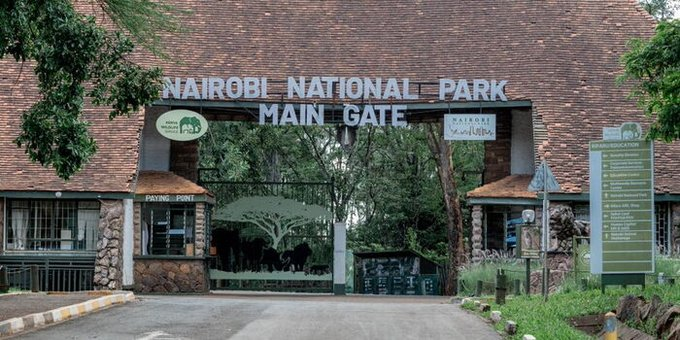News
KWS Announces New National Park Entry Fees Effective October 1
The revised charges, approved by Parliament last week under The Wildlife Conservation and Management (Access, Entry and Conservation) (Fees) Regulations 2025, will see Kenyans pay between Sh200 and Sh3,000 depending on the park.

NAIROBI, Kenya — A day after Kenyans enjoyed free entry into national parks, the Kenya Wildlife Service (KWS) has announced a new set of entrance fees for national parks, reserves, and sanctuaries, set to take effect on Wednesday, October 1, 2025.
The revised charges, approved by Parliament last week under The Wildlife Conservation and Management (Access, Entry and Conservation) (Fees) Regulations 2025, will see Kenyans pay between Sh200 and Sh3,000 depending on the park.
Under the new tariff, Kenyans visiting Amboseli and Lake Nakuru National Parks will pay Sh2,025, up from Sh1,200, while entry to Nairobi National Park will now cost Sh1,350, a sharp increase from the previous Sh430.
Citizens of other East African countries will be charged Sh1,500 for Amboseli and Lake Nakuru, and Sh100 for Nairobi National Park.
For Nairobi residents and tourists, KWS has introduced a bundled conservation package costing Sh1,750 for Kenyans and Sh1,300 for East Africans.
The package grants access to Nairobi National Park, the Nairobi Animal Orphanage, and the Nairobi Safari Walk.
Entry to Tsavo East and Tsavo West will now cost Sh1,350 for Kenyans and Sh1,000 for East Africans, while Meru, Kora, and Aberdare National Parks have been priced at Sh1,100 and Sh800 respectively.
Popular hiking destinations such as Mt Kenya, Mt Longonot, Mt Elgon, Hell’s Gate, and Kakamega Forest will now cost Sh675 for Kenyans.
Children and students have also been factored into the new framework. Entry to Amboseli and Lake Nakuru will cost Sh1,050, while Tsavo East, Tsavo West, Meru, Kora, and Aberdare will charge Sh675.
Special packages include Sh950 for the Nairobi circuit (National Park, Orphanage, Safari Walk) and Sh1,550 for the Tsavo–Amboseli package.
Table comparing old vs new KWS park entry fees for Kenyans:
| Park/Package | Old Fee (Kenyans) | New Fee (Kenyans) |
| Nairobi National Park | Sh430 | Sh1,350 |
| Amboseli & Lake Nakuru | Sh1,200 | Sh2,025 |
| Tsavo East & Tsavo West | Sh1,030 | Sh1,350 |
| Meru, Kora & Aberdare | Sh800 | Sh1,100 |
| Mt Kenya | Sh800 | Sh1,100 |
| Hell’s Gate, Mt Longonot, Mt Elgon, Ol Donyo Sabuk, Kakamega, Shimba Hills, Lake Elementaita | Sh400 | Sh675 |
| Nairobi Package (Nairobi NP, Orphanage, Safari Walk) | Not Available | Sh1,750 |
| Tsavo–Amboseli Package (Children/Students) | Not Available | Sh1,550 |
KWS Director General Prof. Erustus Kanga said the changes were long overdue, noting that the last comprehensive review of conservation fees was carried out 18 years ago.
“The revised fees are the result of an open, year-long consultative process involving conservationists, tourism stakeholders, and the public,” Prof. Kanga said in a statement on Monday.
“The adjustments are necessary to strengthen the financial sustainability of wildlife conservation and improve visitor experiences.”
To protect visitors who had already booked trips, KWS confirmed that payments made through e-Citizen prior to the announcement will be honored, with new charges only applying to bookings from October 1 onwards.
Foreign tourists will pay between $4 and $215 depending on the park and activity. Camping fees have been set between Sh200 and Sh700.
The regulations also outline exemptions for Kenyans aged 70 and above, children under five, persons with disabilities, registered tour drivers, guides, boat crews, and porters.
Beach Management Units’ fishing boats will similarly be exempted from anchorage fees.
KWS emphasized that visitors will be required to present valid identification upon entry, including national ID cards for Kenyans, passports for East Africans and other foreign citizens, and student IDs for learners.
The new tariff is expected to raise mixed reactions, particularly among local tourists, even as conservationists argue that the fees are necessary to secure Kenya’s wildlife heritage.
Kenya Insights allows guest blogging, if you want to be published on Kenya’s most authoritative and accurate blog, have an expose, news TIPS, story angles, human interest stories, drop us an email on [email protected] or via Telegram
-

 Grapevine2 weeks ago
Grapevine2 weeks agoRussian Man’s Secret Sex Recordings Ignite Fury as Questions Mount Over Consent and Easy Pick-Ups in Nairobi
-

 News1 week ago
News1 week agoTHE FIRM IN THE DOCK: How Kaplan and Stratton Became the Most Scrutinised Law Firm in Kenya
-

 Investigations2 weeks ago
Investigations2 weeks agoMulti-Million Dollar Fraud: Three Kenyans Face US Extradition in Massive Cybercrime Conspiracy
-

 Economy1 week ago
Economy1 week agoIran Demands Arrest, Prosecution Of Kenya’s Cup of Joe Director Director Over Sh2.6 Billion Tea Fraud
-

 Business1 week ago
Business1 week agoA Farm in Kenya’s Rift Valley Ignites a National Reckoning With Israeli Investment
-

 Africa2 weeks ago
Africa2 weeks agoFBI Investigates Congresswoman Ilhan Omar’s Husband’s Sh3.8 Billion Businesses in Kenya, Somalia and Dubai
-

 Grapevine6 days ago
Grapevine6 days agoA UN Director Based in Nairobi Was Deep in an Intimate Friendship With Epstein — He Even Sent Her a Sex Toy
-

 News2 weeks ago
News2 weeks agoTragedy As City Hall Hands Corrupt Ghanaian Firm Multimillion Garbage Collection Tender
















